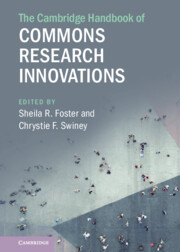Book contents
- The Cambridge Handbook of Commons Research Innovations
- The Cambridge Handbook of Commons Research Innovations
- Copyright page
- Contents
- Figures
- Tables
- Contributors
- Introduction
- Part I Revisiting the Origins and Evolution of Commons Thought
- Part II Averting New Tragedies
- Part III New Forms of Contested Commons
- Part IV Urban Landscape and Infrastructure as a Commons
- Part V Reassessing Old and New Institutions for Collective Action
- Part VI Managing and Restoring the Commons
- 17 Management of Facilitated Common Pool Resources in India
- 18 Social Environmental Dilemmas and Governing the Commons
- 19 Social Trust, Informal Institutions and Community-Based Wildlife Management in Namibia and Tanzania
- 20 Restoring the Commons
- Part VII Law, Legal Theory, and the Commons
- Part VIII Technology, the Internet, and the Future of Commons Governance
- Index
17 - Management of Facilitated Common Pool Resources in India
from Part VI - Managing and Restoring the Commons
Published online by Cambridge University Press: 29 October 2021
- The Cambridge Handbook of Commons Research Innovations
- The Cambridge Handbook of Commons Research Innovations
- Copyright page
- Contents
- Figures
- Tables
- Contributors
- Introduction
- Part I Revisiting the Origins and Evolution of Commons Thought
- Part II Averting New Tragedies
- Part III New Forms of Contested Commons
- Part IV Urban Landscape and Infrastructure as a Commons
- Part V Reassessing Old and New Institutions for Collective Action
- Part VI Managing and Restoring the Commons
- 17 Management of Facilitated Common Pool Resources in India
- 18 Social Environmental Dilemmas and Governing the Commons
- 19 Social Trust, Informal Institutions and Community-Based Wildlife Management in Namibia and Tanzania
- 20 Restoring the Commons
- Part VII Law, Legal Theory, and the Commons
- Part VIII Technology, the Internet, and the Future of Commons Governance
- Index
Summary
Several funded projects have been implemented to revive the degrading common pool resources (CPR) in rural India. In such projects facilitating agencies play an important role. The extant literature on CPR institutions highlights the role of community and focuses on long-enduring and self-driven CPRs. It does not put much emphasis on facilitated institutions where an external agency plays critical roles. This paper tries to fill this gap by understanding how facilitating organizations engage with local dynamics and influence the outcomes. Based on a qualitative study of CPRs in 19 villages facilitated by 12 agencies in India, the study found that CPR development interventions are context-specific and often go through iterative processes. The facilitating organization does not play the role of a catalyst; instead, it actively influences the decision-making process through complex interactions at the community level. In doing this, the facilitating organization's priorities and preferences (which need not be compatible with the community's priorities) come to the forefront.
- Type
- Chapter
- Information
- The Cambridge Handbook of Commons Research Innovations , pp. 203 - 215Publisher: Cambridge University PressPrint publication year: 2021

